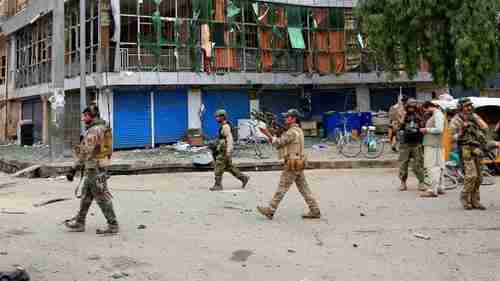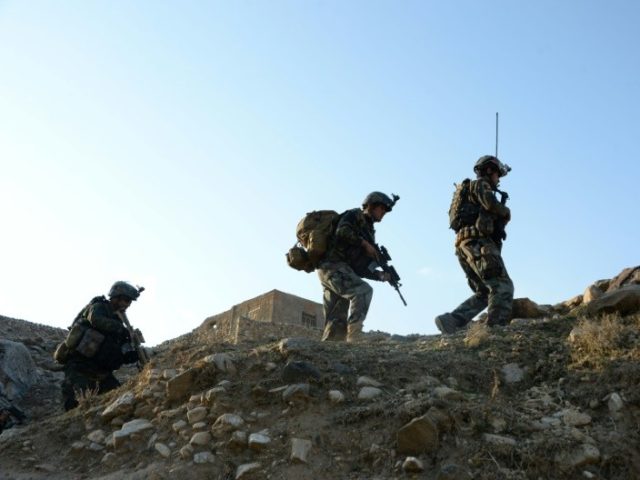This morning’s key headlines from GenerationalDynamics.com
- Taliban launches major military operation in Farah province in Afghanistan
- Afghan officials blame Iran and Pakistan
- Afghan government continues to lose control to the Taliban
Taliban launches major military operation in Farah province in Afghanistan

Afghan security forces respond to the Taliban attacks on Tuesday (Reuters)
It is just the beginning of the Taliban’s Spring Fighting Season, and Afghanistan government forces have apparently been caught completely by surprise by an overwhelming Taliban attack on Farah City, the provincial capital of Farah province. Farah province is in western Afghanistan, on the border with Iran.
Hundreds of Taliban attackers overran several security checkpoints in coordinated attacks starting at 2 a.m. on Tuesday. Heavily armed Taliban fighters, using captured Afghan military HUMVEEs and police pickup trucks, launched the coordinated assault on Farah City overnight from multiple directions. Afghan security forces have responded but had to be backed up by American and NATO warplanes, including A-10 Warthogs.
A government official claimed that no government building or organization had fallen to the Taliban, but residents are claiming that the city is close to total collapse, and government officials have a history of reporting fake news in these situations. Videos released on social media show that a number of security forces vehicles have been torched and that the Taliban have entered a building used by the security forces. The clashes are ongoing. Tolo News (Afghanistan) and Long War Journal and Business Insider
Afghan officials blame Iran and Pakistan
Afghan officials have long complained that Iran’s Islamic Revolutionary Guard Corps (IRGC) aid the Taliban insurgents in western Afghanistan in an effort to torpedo construction projects and undermine stabilization efforts by the U.S.-led coalition in the region. Unlike in the past, IRGC-affiliated media outlets now openly express support for the Taliban’s latest territorial gains in western Afghanistan. Commentary in the IRGC outlets also indicates that Iran’s support to the Taliban is aimed at expelling U.S. and NATO forces from Afghanistan, particularly from western Afghan provinces.
Farah is the fourth largest province in Afghanistan, with a population of 925,000 in 11 districts. According to the U.S. Naval University in 2009, 50 percent of the Farah population is composed of Pashtun tribes, 45 percent of Tajik and the rest of the population, including the Diaspora, Hazaras and Baluchs. Middle East Institute and Tasnim News (Iran) (Translation)
Afghan government continues to lose control to the Taliban
Taliban began its Spring Fighting Season in late April, and according to Afghan officials, the Taliban have carried out over 2,700 attacks across the country in the first 19 days of the Spring Fighting Season. In the last week, Afghan security forces suffered heavy losses in clashes against insurgents across the country so, on Sunday, the Afghan interior ministry said that security forces have retreated from some areas that have high threat levels so as to avoid additional fatalities.
On the other hand, General Joseph Votel, the commander of U.S. Central Command, said a few days ago:
The message I would send to the Taliban is that they cannot win militarily. The international coalition, led by the United States, is focused on providing the military pressure, in conjunction with social pressure and diplomatic pressure that will force them to come to the table.
It is certainly true that as an anti-government insurgency they cannot win militarily, but it is equally true that there is no chance whatsoever to “force them to come to the table.”
I have been saying this repeatedly for many years, and the reasons are just as true today as ever.
As I have explained many times, Afghanistan’s last generational crisis war was the extremely bloody Afghan crisis civil war, 1991-96, which mostly pitted the ethnic Pashtuns, who are Sunni Muslims and later formed the Taliban, versus the Northern Alliance of Tajiks, Hazaras, and Uzbeks in northern Afghanistan. Now, twenty years later, Afghanistan is in a generational Awakening era, and a new young generation of Pashtuns is coming of age, raised on stories their parents told them about the atrocities committed by the Northern Alliance, and they’re looking for revenge.
But you do not have to know anything about generational history to understand what is going on. You just have to understand that there was an extremely bloody, violent civil war in 1991-96, pitting the Pashtuns versus the Northern Alliance of Tajiks, Hazaras, and Uzbeks in northern Afghanistan. And you have to know that the Taliban are Pashtuns, and that young Pashtuns are looking for revenge for atrocities committed in the 1990s, and that NATO troops are completely irrelevant.
So the funny thing is that even if Votel’s claim that military force targeting a group of Taliban leaders could “force them to come to the table,” the children of those Taliban leaders will have none of it. It is possible that most of the Taliban fighting in Farah province today were just children in school just a few years ago.
As war with China and Pakistan approaches, President Trump wants to keep American troops active in Afghanistan and to continue to maintain several American military bases in Afghanistan, including two air bases in Bagram and Kandahar International Airport. These bases will be valuable in any future war with China. Under these circumstances, having troops in Afghanistan is what matters, whether the Taliban are defeated or not. RFE/RL and Tolo News (Afghanistan) and RFE/RL
Related Articles
- Nine journalists killed by suicide bombers in Kabul Afghanistan (01-May-2018)
- ISIS-K suicide bomber kills over 50 in Kabul, Afghanistan, registering to vote (23-Apr-2018)
- New reports show that Taliban are gaining territory in Afghanistan (01-Feb-2018)
- Trump promises victory in Afghanistan by redefining ‘victory’ (23-Aug-2017)
- Kabul bombing brings back memories of bloody 1990s Afghan civil war (03-Jun-2017)
- Brief recent generational history of Afghanistan (25-Jul-2017)
KEYS: Generational Dynamics, Afghanistan, Taliban, Farah City, Farah Province, Spring fighting season, Iran, Islamic Revolutionary Guard Corps, IRGC, Pashtuns, Taliban, Northern Alliance, Tajiks, Hazaras, Uzbeks, Nato, Resolute Support, Bagram, Kandahar International Airport
Permanent web link to this article
Receive daily World View columns by e-mail

COMMENTS
Please let us know if you're having issues with commenting.